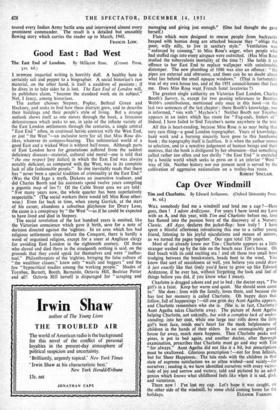Cap Over Windmill
WILL somebody find me a windmill and lend me a cap ?—Here goes, then I I adore Ardizzone. For years I have loved my Love with an A, and this year, with Tim and Charlotte before me, love has flamed into the passion horn of the discovery of a Nursery Classic. All Ages, declares the jacket-flap: how truly I I have spent a blissful afternoon introducing this one to a rather young friend, listening to his joyful ejaculations and moans of sorrow, as we turned, the pages together. Our ages total 120 years. Most of us already know our Tim ; Charlotte appears as a little stranger washed up by the tide on the beach near Tim's house. Oh that beach with its cold exciting sea ! and oh those two small boys trudging between the breakwaters, heads bent to the wind, You know that sort of seasideness so well, you believe you could draw it just exactly like that (only you'd have to grow up like Edward Ardizzone, if he ever has, without forgetting the -look and feel of things before you did, if you know what I mean).
Charlotte is dragged ashore and put to bed ; the doctor says, "The girl's in a faint. Keep her warm and-quiet. She should soon come to." She does ; lives with the family, loves them, and because she has lost her memory is called Charlotte. Oh happy days that
follow, full of happenings one grim day Aunt Agatha appears, and Charlotte remembers who she is. (She is, in fact, Charlotte.) - Aunt Agatha takes Charlotte away. The picture of Aunt Agatha helping Charlotte, not unkindly, but with a complete lack of under- standing, into her coat, while one large tear rolls down the little girl's bent face, rends one's heart for the meek helplessness of children in the hands of their elders In an unimaginably grand house far away, much more happens. Then Charlotte peaks and pines, is put to bed again, and another doctor, after thorough examination, prescribes that Charlotte must go and stay with Tim "for always.' Aunt Agatha did not like it a bit, but prescriptions y must be swallowed. Glorious prescription !—not for lion Jelloids, but for Sheer Happiness. The tale ends with the children in that state of supreme satisfaction we so often wished—and vainly—for ourselves ; reading it, we have identified ourselves with every vicissi- tude of joy and sorrow and victory, told and pictured by an adult genius which knows what childhood feels like when it is sad, glad, and victorious.
There now ! I've lost my cap. Let's hope it was caught, on the other side of the windmill, by some child coming home for the






































 Previous page
Previous page